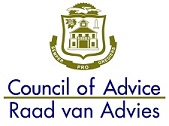The tasks of the Council of Advice - this website is under construction
PURPOSE OF ADVISING
The Council gives advice with the knowledge that the responsibility for legislation and administrative decisions lies not with the Council but with the legislator or administrative authorities. With our advices the Council aims to contribute to the establishment of qualitative legal rules and regulations by addressing the lawfulness, constitutionality, efficiency, effectiveness, interest of minorities, consistency and continuity in our advices.
The objective which the Government (or the initiator) aims to achieve with its legislation is the starting point for advising. The Council does not have any political aspirations when advising. The advice is based on the objectives as presented by Government. The advice seeks to facilitate the achievement of the objectives set up by Government or the initiator while taking into consideration the legal and qualitative requirements that a democracy and the Rule of Law places on legislation.
ASSESSMENT FRAMEWORK
The Council assesses draft legislation based on an assessment framework consisting of three parts.
The drafts are not assessed based on political ideologies or views, but on standards of democracy and the rule of law. The policy-analytical assessment takes as its departure point the chosen goals and evaluates the draft legislation on its enforceability and whether or not the chosen method will help realize the objectives. Questions about acceptability of the chosen objectives and methods are more at the center of the judicial assessment. With the judicial assessment the Council assesses if the proposal is in accordance with (international) higher written and unwritten laws. While in addition assessing how the proposal fits into the already existing system of laws.
Law proposals are assessed based on their simplicity, clarity and accessibility during the legal-technical assessment. This assessment entails technical aspects of law making such as logical and systematic make up, internal cohesion and proper terminology.
DICTA OF THE COUNCIL OF ADVICE
The Council gives advice with the knowledge that the responsibility for legislation and administrative decisions lies not with the Council but with the legislator or administrative authorities. With our advices the Council aims to contribute to the establishment of qualitative legal rules and regulations by addressing the lawfulness, constitutionality, efficiency, effectiveness, interest of minorities, consistency and continuity in our advices.
The objective which the Government (or the initiator) aims to achieve with its legislation is the starting point for advising. The Council does not have any political aspirations when advising. The advice is based on the objectives as presented by Government. The advice seeks to facilitate the achievement of the objectives set up by Government or the initiator while taking into consideration the legal and qualitative requirements that a democracy and the Rule of Law places on legislation.
ASSESSMENT FRAMEWORK
The Council assesses draft legislation based on an assessment framework consisting of three parts.
- The policy-analytical assessment
- The judicial assessment
- The legal-technical assessment
The drafts are not assessed based on political ideologies or views, but on standards of democracy and the rule of law. The policy-analytical assessment takes as its departure point the chosen goals and evaluates the draft legislation on its enforceability and whether or not the chosen method will help realize the objectives. Questions about acceptability of the chosen objectives and methods are more at the center of the judicial assessment. With the judicial assessment the Council assesses if the proposal is in accordance with (international) higher written and unwritten laws. While in addition assessing how the proposal fits into the already existing system of laws.
Law proposals are assessed based on their simplicity, clarity and accessibility during the legal-technical assessment. This assessment entails technical aspects of law making such as logical and systematic make up, internal cohesion and proper terminology.
DICTA OF THE COUNCIL OF ADVICE
The Council uses a final formal statement (dictum) at the end of proposed draft legislation. Depending on the observations made by the Council in its advice, the Council can advise one of the following dicta to government, concerning draft ordinances and draft decrees containing general measures.
- To send/adopt the draft;
- To send/adopt the draft, after attention has been paid to the observations of the Council;
- To send/adopt the draft, after the observations of the Council have been considered;
- Not to send/adopt the draft, until the observations of the Council have been considered;
- Not to send/adopt the draft in this manner;
- Not to send/adopt the draft.
Note: advices on draft initiative ordinances do not have dictums. In these cases the Council gives a brief summarizing conclusion.
